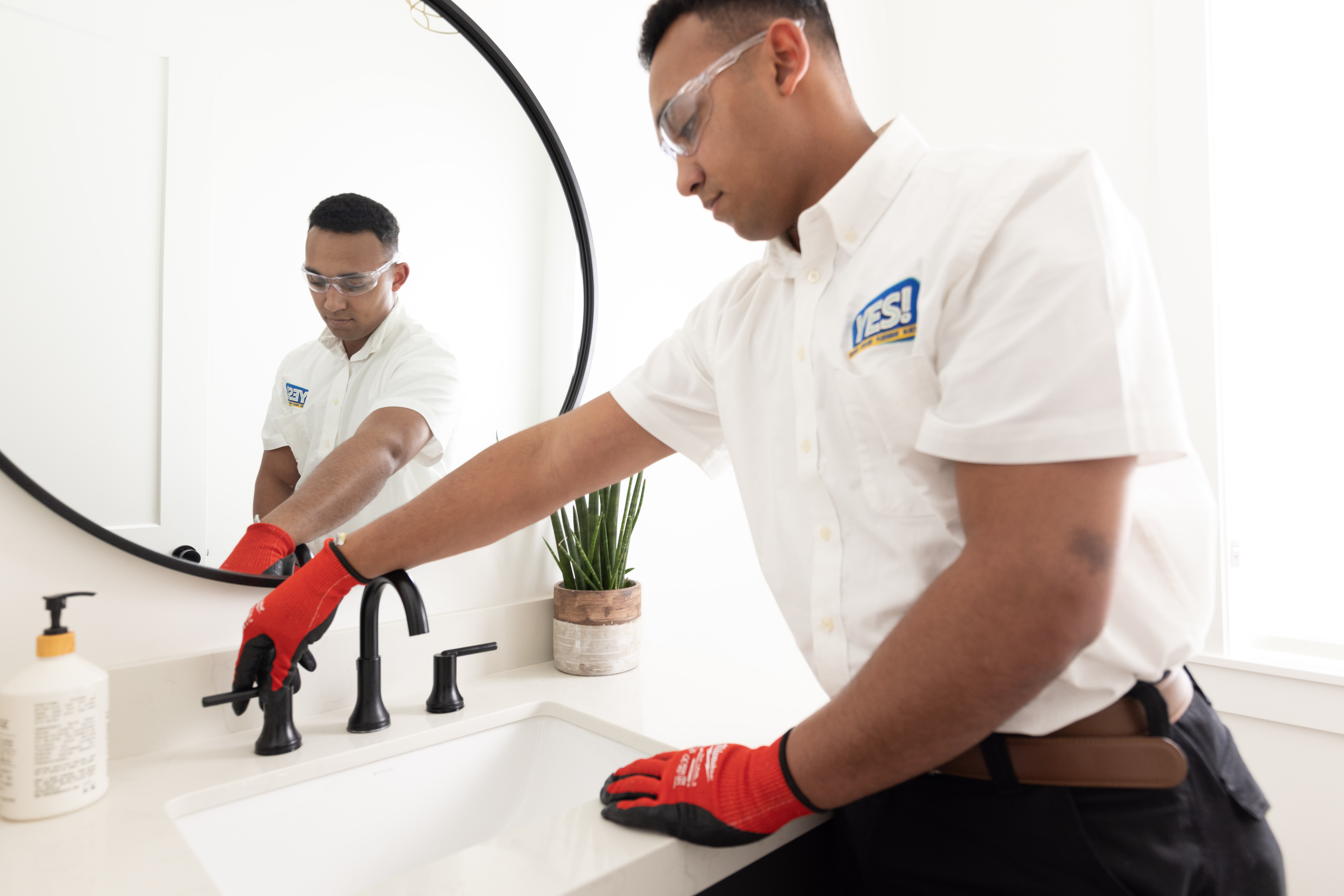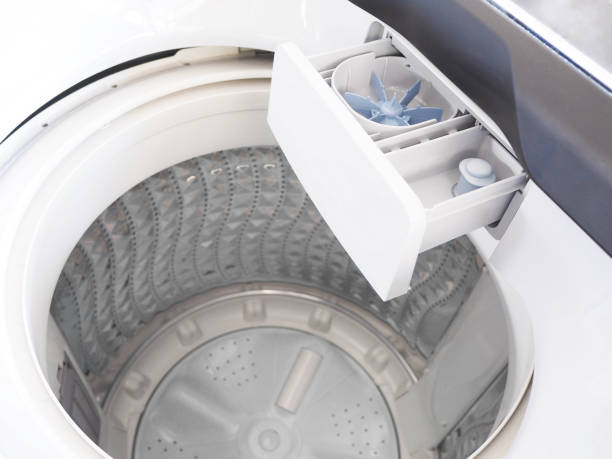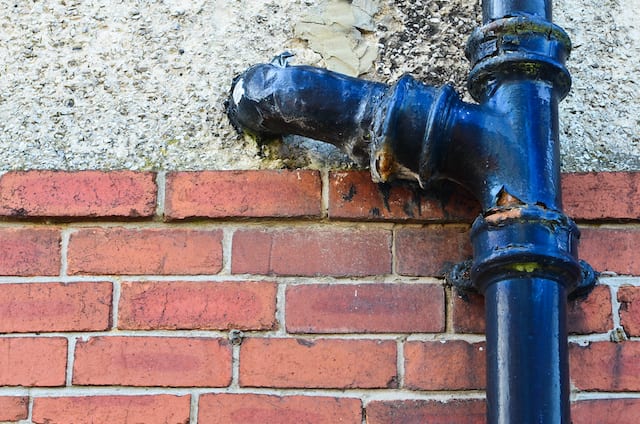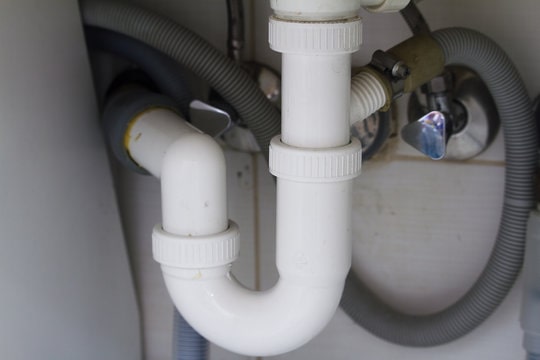7 REASONS WHY YOUR WASHING MACHINE IS BACKING UP INTO THE KITCHEN SINK

Every now and then something strange happens that is simultaneously baffling and frustrating in your home. Gray water from your washing machine backing up into your sink is one such problem. For many homeowners, it can be an ongoing source of annoyance.
WHY IS MY WASHING MACHINE BACKING UP INTO THE SINK?
If your kitchen sink is backing up when washing laundry you may have a clogged drain or a venting issue, but it could be other issues. Start to identify the problem and contact your local plumbing company for help.
To start with, know that your sink and washing machine drain lines tend to run congruent to each other. This means they combine at some point on the way to the main sewer line. So, if there is a problem after they combine, it can affect both systems.
HOW TO FIND THE PROBLEM
First, you must pinpoint the problem. More often than not, a washing machine backing up into sink will occur in one or more sinks during or after the drain cycle of your washing machine. This may not happen every time or it may get progressively worse. It depends on why it is happening in the first place.
If the sink doesn’t back up on its own when you do the dishes or run the faucet, the clog is probably deeper in the pipes and only responds to the large volume of water being drained from your washing machine. In either case, you probably have a clog in the drainage pipe after the two combine.
OTHER POSSIBLE PROBLEMS THAT COULD CAUSE A WASHER TO BACKUP
THE WASHING MACHINE USES TOO MUCH WATER FOR THE DRAIN

Your washing machine might use too much water due to incorrect load size settings, malfunctioning water level sensors, or a faulty inlet valve.
In an older home, the plumbing might have been designed for smaller washing machines. Modern, high-capacity washers pump out significant water volume, which can ultimately overwhelm the capacity of the drain, forcing water to back up into the sink.
Over time, wear and tear can impair these components, causing the machine to overfill. Regular checks and maintenance can prevent this and potential drainage issues.
HOUSE HAS CAST-IRON PIPES

Houses with cast iron pipes can face problems like corrosion, rusting, and sediment or mineral buildup. Cast-iron pipes are pretty durable, but are unfortunately prone to these types of issues and can create clogs, even with moderate water flow, causing backups.
Over time, these pipes may develop leaks or become brittle and break. Accumulated rust can also lead to discolored water and reduced water flow, potentially impacting water quality and overall plumbing efficiency.
THE P-TRAP IS CLOGGED

A P-trap is a U-shaped section of a drainpipe that is designed to trap a small amount of water in it at all times. This standing water acts as a seal to prevent sewer gasses from entering a building through a fixture's drain, such as a sink, bathtub, or toilet. The curvature also allows for the easy removal of obstructions and debris.
If the trap dries out or becomes clogged, it can allow sewer odors to seep into the living space. Gross scraps or debris are prime culprits along with accumulated hair or lint that can accumulate and cause issues like a washer backing up into the sink, stopping water flow, or breaking your washing machine.
If you're experiencing any of these issues, contact our team of expert plumbers. We'll be able to diagnose your issue and give you a quote for the repairs.
KITCHEN & WASHING MACHINE SHARE SAME DRAIN
Your home likely has a single drain line between your washing machine and your kitchen sink, so it makes sense that any drain issue could impact either one.
If you have a new washer, make sure that your drains can handle newer-model washing machines and keep the drain clean and maintained to prevent major, damaging water backups.
WATER IS DRAINING OUT OF THE WASHER, BUT IS BACKING UP AT THE PIPES ON THE WALL/FLOOR
First of all, if this is happening to you we feel for you! If there is literally nowhere for the water to go, it’s going to backup somewhere.
This type of plumbing backup can get messy and usually means there’s a clog further down your drainpipe or there is an issue with the drain box. This type of issue often happens beyond the sink and makes it so water can’t properly escape or drain.
Water damage is no joke, so make sure to call a qualified plumber like the experts at YES! to give you a hand.
WATER IS NOT DRAINING OUT OF THE WASHER
If this is happening to you, it could be an issue with the plumbing or an issue with the washing machine itself. For example, a faulty drain pump within the washer itself can stop it from draining the washer water effectively. Things like jammed pump impellers, broken belts, electrical pieces, or other broken parts can directly cause this issue.
Keep in mind that a plumber can assist you if the issue resides within your pipes or your home. If you have a home warranty, your washer may be included but otherwise, an appliance repairman can assist you with this.
WASHER HAS WRONG TEMPERATURE
If you’re washing things like towels and undergarments, you probably need hot water, which is why modern washing machines have special settings for hot wash cycles. But hot water can act like glue that can worsen clogs or leaks.
If you use a lot of hot water just remember that it can eventually cause debris and dirt to solidify further down the drains, potentially worsening an existing clog and leading to backups that take more labor to uncover and fix.
HOW TO STOP YOUR WASHER FROM BACKING UP INTO YOUR SINK
Do NOT use any chemicals to clear the clog. Not only can chemicals cause damage to your pipes, which can lead to cracks and leaks later, they are not always effective at actually removing the problem – they simply minimize it in the short term.
At YES! Air Conditioning, Heating, Plumbing, and Electric, we have the equipment and knowledge to locate and clear stoppages. Give us a call for an appointment and we will diagnose and clear any blockages you may have in your home.
For additional information on plumbing services, call our team at 844-216-9300 and speak with a technician today.
Other FAQs
- What is the Life Expectancy of Your Water Heater?
- Prevent Home Flooding
- What to do When You're Not Getting Hot Water
- How to Detect a Leak at Home
- How to Tell Pipes Need Replaced
- What Are My Pipes Made Of?
- Why Does My Sink Back Up?
- Signs of Broken Water Line Outside of the Home
- What is U Shaped Pipe Under The Sink?
